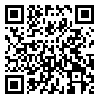مجله رویش روانشناسی از دادن گواهیهای کاغذی معذور است. لطفا تقاضا نکنید. همه گواهی ها در صفحه شخصی کاربران موجود است.
year 13, Issue 10 (Winter 2024-2025 2024)
Rooyesh 2024, 13(10): 91-100 |
Back to browse issues page
Download citation:
BibTeX | RIS | EndNote | Medlars | ProCite | Reference Manager | RefWorks
Send citation to:



BibTeX | RIS | EndNote | Medlars | ProCite | Reference Manager | RefWorks
Send citation to:
Sa'adat Agah N, Ebrahimi Moghadam H, Karbasi M. (2024). Predicting job burnout based on mental fatigue and effort-reward imbalance among nurses in the post-corona era. Rooyesh. 13(10), 91-100.
URL: http://frooyesh.ir/article-1-5687-en.html
URL: http://frooyesh.ir/article-1-5687-en.html
1- Master of General Psychology, Saveh Branch, Islamic Azad University, Saveh, Iran.
2- Associate Professor, Department of Psychology, Roudehen Branch, Islamic Azad University, Roudehen, Iran. ,hem_psy@yahoo.com
2- Associate Professor, Department of Psychology, Roudehen Branch, Islamic Azad University, Roudehen, Iran. ,
Abstract: (1330 Views)
The present study was conducted to predict job burnout based on mental fatigue and effort-reward imbalance among nurses in the post-corona era. The present research method was descriptive-correlational. The statistical population included all the nurses working in the hospitals of Tehran University of Medical Sciences who have taken care of patients with COVID-19 in recent years, in 2023, out of which 200 people were selected as a sample using the available and non-random sampling method. The data were collected using Maslach & Jackson's Maslach Burnout Inventory (MBI, 1981), Johansson et al's Mental Fatigue Scale (MFS, 2010) Siegrist et al's Effort-Reward Imbalance Questionnaire (ERIQ, 2009). Multiple regression analysis was used to analyze the data. The findings of the research showed that mental fatigue and effort-reward imbalance were able to predict job burnout (p<0.05) and explained 54.1% of the variance of job burnout. Therefore, it can be concluded that mental fatigue and effort-reward imbalance play a significant role in predicting job burnout and it seems necessary to pay attention to these factors to reduce job burnout in nurses in the post-corona era.
Type of Article: Research |
Subject:
General Psychology
Received: 2024/09/24 | Accepted: 2024/10/19 | ePublished: 2024/12/30
Received: 2024/09/24 | Accepted: 2024/10/19 | ePublished: 2024/12/30
Send email to the article author
| Rights and permissions | |
 |
This work is licensed under a Creative Commons Attribution-NonCommercial 4.0 International License. |





